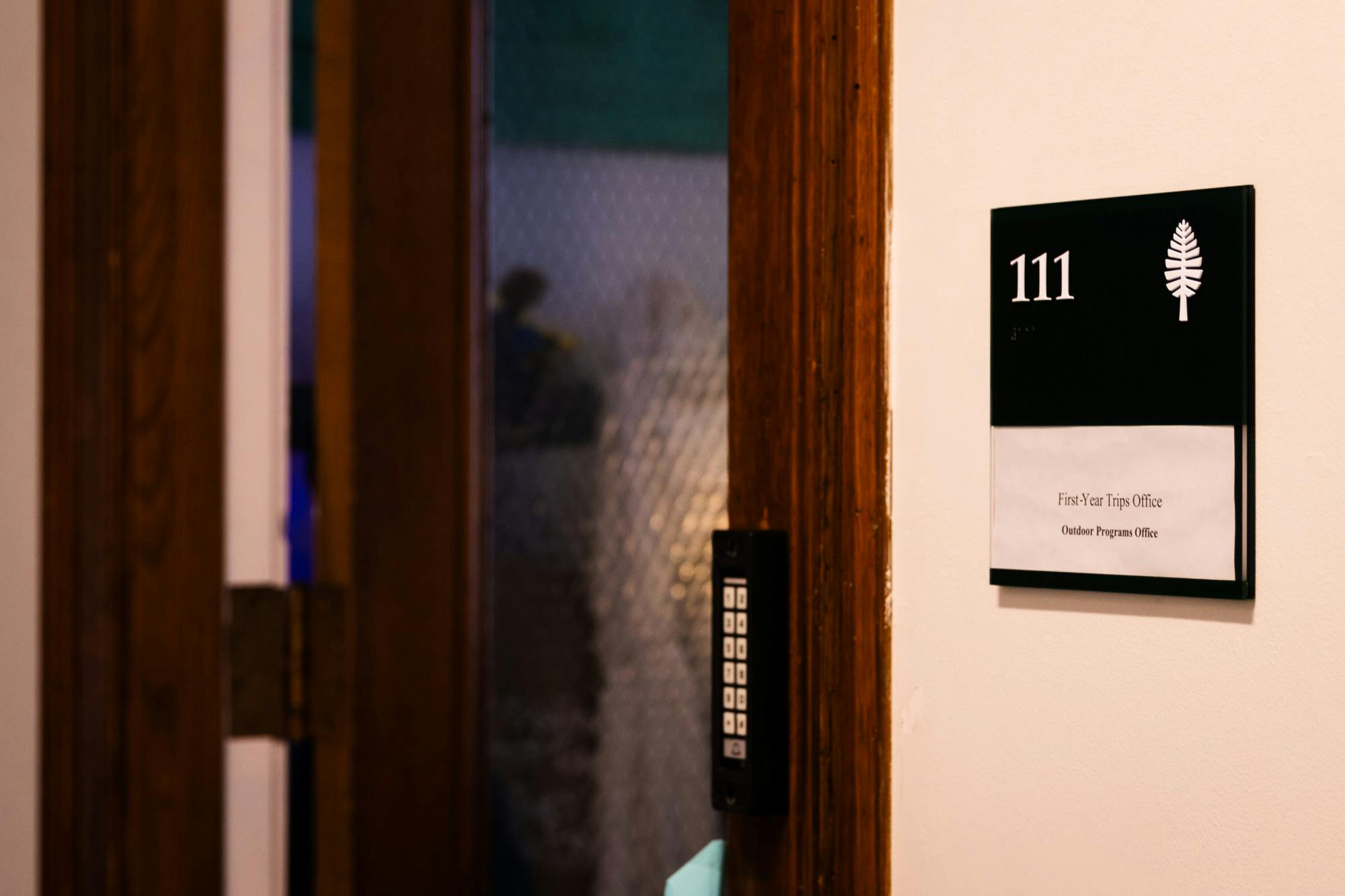This article is featured in the 2023 Freshman special issue.
To the freshman stepping foot on Dartmouth’s campus for the first time, First-Year Trips is a four-day whirlwind. In September 2021, I, along with hundreds of my classmates, flooded across the Green to meet our Trips groups. I frantically searched for my Trip Leaders, who held a massive, sparkling sign that said B48. Due to an influx of positive COVID-19 tests among volunteers, Trips were shortened, but we still hiked, canoed, climbed, kayaked, camped and convened with other trippees, Trip Leaders and Croolings at Moosilauke Ravine Lodge — in Trips lingo, the Lodj — and the Ski Lodge — the Sklodj. For the first time, I saw the White Mountains of New Hampshire and was struck by the immense power of being at a school surrounded by nature and the profound sense of belonging brought by dancing with 200 strangers in a field.
Behind all of the goofiness and wisdom First-Year Trips brings to incoming freshmen, there is a whole network of current students in Robinson Hall working not four days, but nine months to coordinate this outpouring of excitement.
For the Class of 2027, the man heading this operation is director of First-Year Trips Miles Harris ’23. As I walked into his office in Robinson Hall, I was immediately struck by the memorabilia covering the walls — colorful quilts and banners from prior years, illustrations of Croolings and their dyed hair and posters filled with rainbows of post-it notes. Harris has participated in Trips leadership since his sophomore year, first as an Orientation Peer Leader, then as a Croo captain, before taking on his current role.
Harris noted that the pandemic has affected the DOC’s ability to run Trips, which were canceled in 2020 and shortened the year after that.
“Last year would have been the first of what you could call ‘normal’ Trips since 2019,” Harris said.
However, Harris explained that 2023 Trips will retain the new format introduced in 2022. According to Harris, prior to 2022, there were 10 different sections of Trips, running from A up to K. Now, there are only four: A through D.
With the four section format, “people stand a better chance of getting a more diverse Trip with people from a variety of backgrounds,” Harris said.
However, he noted that cutting the number of Trips sections down from 10 to four has posed its own problems, with larger sections requiring a greater number of volunteers and making it necessary to operate the Lodj and Sklodj at the same time.
“There were a lot of growing pains, as we … figured out, ‘what does it look like to run Trips in this new format?’” Harris said. “All of our sections are much larger than they used to be. We ran into some places where [the growing pains] led to a bit of excessive volunteer workload last year … stuff that we can hopefully avoid this year.”
This year’s Trips directorate has also changed the types of Trips offered, according to Harris. Trips that lacked qualified leaders, interest or a logistically-feasible location were not offered this year. As a result, students do not have the option of participating in rod and reel fishing, horseback riding, whitewater kayaking, disc golf and several sections of timber sports. However, a new trip, “Sacred Spaces,” was added.
According to Harris, Tucker Center multi-faith advisor Ellie Thompson approached the directorate with the idea for a Trip that would explore “various centers of faith at Dartmouth.” However, he added that Sacred Spaces is not exclusively about religious or spiritual spaces on and around Dartmouth.
“If you have a space that brings you a particular amount of peace at Dartmouth, or a place that you go when you just want to get away and settle down like a bench in Pine Park … that can be a sacred space to someone,” Harris explained.
Every Trip has a four-day, three-night itinerary, for which Trips coordinators must reserve campsites, contact location hosts — such as museums, farms and social impact organizations, order gear and more. Madeline Wolfe ’25 is one of the two outdoor logistics coordinators who organize these itineraries.
Wolfe, who assumed the role of outdoor logistics coordinator after her position as a Trip Leader last year, said she plans approximately 150 trips that go out all within the span of under a week. She added that she was particularly excited about a trip type she created for this year called “Farm Hopping,” which takes freshmen to three different farms around the Upper Valley.
Aside from adding new trips, Wolfe works on planning realistic itineraries for different trips. Wolfe brings knowledge and expertise to planning Trips in this area as someone who has “been hiking in the White Mountains [her] entire life.”
In addition to figuring out the content of each Trip, the directorate is responsible for the many logistical considerations involved. Sustenance coordinator Madi Duhnoski ’23 is responsible for coordinating the food for everyone involved in Trips, which she says is between 1400 to 1500 people.
Duhnoski said she has been working on menu planning for outdoor settings and has spoken to managers at Dartmouth Dining Services and the Hanover Co-Op about food safety and freshness.
“I hope that people feel nourished,” Duhnoski said. “I hope that people can reflect on their trips and be like, ‘you know, maybe that was my first time eating Annie’s Mac, maybe I don't like lentils that much and wouldn’t eat that again. But in that moment, it fed me, and I’m grateful for that.’”
Anna St. Jean ’25, Lodj Croo co-captain, said that Trips was a significant experience for her, and she looks forward to welcoming a new class.
“It’s truly incredible that I live in a community where there are so many people that are excited to welcome the incoming class … that’s really cool to see,” St. Jean said.
The Lodj Croo captain traditionally leads dances, including the Salty Dog Rag, and organizes post-dinner traditions like watching the film “Schlitz on Mt. Washington.” St. Jean said she wanted to add options for campers who might be overwhelmed after “spending three days in the woods and meeting a lot of new people already.”
“[Lodj Croo co-captain Armita Mirkarimi ’25] and I are working on not only having those super high-energy, boisterous activities, like dancing and the medley and such, but also focusing on having some more low key activities, like board and card games, crafts and calm spaces,” St. Jean said.
Inclusion Coordinator Nico Ludkowski ’26 is similarly hard at work to make sure trippees, Trip Leaders and Croolings feel comfortable on Trips while still “embrac[ing] a little bit of the discomfort of trying new things and getting outside.”
They said that Trip Leader trainings, guidebooks and outreach have been informed by discussions around “different cultural needs, discomfort in the outdoors and perhaps discomfort of being in a new place.”
Ludkowski said that inclusivity on Trips manifests in different ways; for example, students have different prior experience with the outdoors, and what one Trippee might consider “commonplace” might be completely unfamiliar and uncomfortable to another. Ludkowski said they talked to “folks in different groups such as FYSEP, FGLI and the international students program to get their perspective on how we can improve Trips.”
Although Ludkowski said they are doing “what [they] can,” they acknowledged that “a lot of the troubles around inclusivity in the outdoors are more systemic” and cannot be tackled by one person or group.
Overall, the directorate has shown deep dedication toward welcoming the Class of 2027 with love and open arms.
“Trips has been immensely meaningful to me — that’s why I’m directing it,” Harris said. “My hope is that ’27s can get some of that sense of meaning and some of the feeling that Trips is one of Dartmouth’s biggest expressions of welcome and love for the incoming class.”
Correction Appended (Sept. 28, 1:26 p.m.): A previous version of this article referred to Trips as the Dartmouth Outing Club’s First-Year Trips, but Trips are no longer run by the DOC. The article has been updated for clarity.




